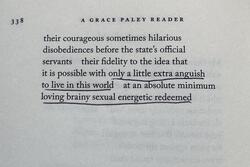A Sisterly Homeland
Since we were very young, my sister and I have been planning on going on our Birthright trip as soon as my sister turns 18. We have not always been close, my sister and I, but going on this trip together has been something that seemed important to us. The idea of the trip was less about going to Israel, and more about strengthening our sisterly bond through a shared, spiritual experience.
This past summer, I’ve begun to question this anticipated trip, following the campaign of the Jewish organization If Not Now, called Birthright: Not Just A Free Trip, in an attempt to urge Birthright “to tell the truth about the Israeli Occupation to the tens of thousands of young American Jews that will participate in its programming.” The campaign has gained attention on Twitter as the organization highlighted groups of American Jews who have walked off their Birthright trips in order to meet and talk with Palestinian people.
Some people feel that the Not Just A Free Trip movement is not doing enough: Twitter user @stellaboonshoft responded to this ongoing discussion saying, “I’ve had great success protesting birthright by not going.” She felt that rather than walking off a Birthright trip to protest Birthright, not participating at all would be the best way to protest. After reading this tweet, I had to take a moment to carefully re-evaluate the trip that I had been taking for granted for most of my life. “Maybe I shouldn’t go on Birthright either,” I thought.
My sister and I were both raised in what I would describe as a culturally Jewish home. Our cultural history as Jews, our Jewish ancestors, the stories of our people—that was what my mother and father imparted to us as children, not stories from the Torah. However, when I was in fourth grade, my mother and father decided to join a Reform synagogue so that my sister and I could have a more formal religious education, and be Bat Mitzvah’d.
Our education was pretty standard. We learned Hebrew, we discussed various Torah stories, and we learned about the history of Jewish people. As we got older, there was a huge focus placed on the Zionist movement—we did projects on the Balfour declaration, the creation of a constitution, and the formation of the kibbutz movement. Naturally, learning about the history of Israel also involved learning about the history of the Israeli/Palestinian conflict. This is a difficult topic to discuss, especially in a Jewish space, and even more so with a group of twelve-year olds.
I still find it hard to navigate this very nuanced issue. I was raised in a Zionist environment, and the reasons for the creation of a Jewish homeland are still very clear in my mind. Israel has long been a place for Jewish refugees, fleeing the Russian pogroms and the rising anti-semitism leading into the Holocaust. On the other hand, the displacement of the Palestinian people is disturbing as well. How can we, a displaced, diasporic people, reconcile with our forced displacement of another group of people?
The issue becomes personal. My mother, having been to Israel in her younger years, still insists that a two-state solution is the answer. As she faces the political turmoil in our own country, she feels that Israel is the one place that would welcome her with open arms, should she feel the need to emigrate.
Her fear of needing to flee perhaps parallels the immediate need that many Palestinians currently feel. Unlike my mother, Muslim refugees fleeing political turmoil in their own countries have no place to turn. The irony is not lost on me that this idea of Israel as a place of refuge forces others to leave their home, and homeland.
On the one hand, pro-Israel rhetoric easily becomes anti-Muslim rhetoric, which feeds into the Islamophobia that is rampant throughout the western world. A large majority of Palestinian people are Muslim; consequently, blaming Palestinian people for the ongoing war in Israel perpetuates the harmful stereotype of the “violent Muslim.” This argument fails to recognize the humanity that exists on both sides of the debate.
On the other hand, anti-Zionist rhetoric easily becomes anti-semitic rhetoric. I am reminded of the Chicago Dyke March, at which three women were asked to leave because they were carrying pride flags emblazoned with the Star of David. People seem to view Jewish pride as Zionist Pride, without acknowledging the fact that Zionism exists separately from Judaism.
We need to remember that Israel was first created as a Jewish state as a result of violent anti-semitism. We needed a country because we had nowhere else to go. Does this justify the actions that President Netanyahu has taken in regards to the Palestinian people? I feel it does not, but there are many Jews who still feel quite torn.
Birthright has made this struggle even more difficult for me; after seeing @stellaboonshoft’s tweet, I immediately called my sister to see what her point of view was. As soon as I mentioned Birthright she seemed to know exactly where our conversation was headed. “I’ve been meaning to ask you about that, too,” she said, reminding me that despite being my younger sister she always seems to be one step ahead of me. We walked through our options, and talked about how we felt both emotionally and politically. Ultimately I think we’ve decided that Birthright is not the trip for us.
There is a sense of loss that accompanies this decision; something we have always taken for granted has dropped out from under our feet. But our loss pales in comparison to the loss of home and country that Palestinians and Israelis both feel.
My sister and I will still take a trip together. We may not go to Israel, but I think we’ve realized that we are more interested in discovering a relationship with each other than in discovering another homeland.








Great and nuanced job, Savoy!